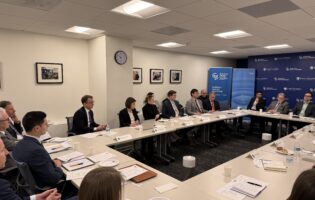German-American Relations since 1990: No Future for Germany’s Past?
On September 18, 2013, AGI hosted a seminar on the changing dynamics of collective memory in German-American relations in the post-Cold War world. Dr. Ruth Wittlinger, a current DAAD/AGI fellow and senior lecturer in the School of Government and International Affairs at Durham University, UK, presented her research on the impact of collective memory, especially memory of the Nazi regime, in postwar German foreign politics.
Collective memory serves as an additional dimension and subjective element of historical interpretation, which is often used in formulating opinions. It is also frequently used to evaluate moral issues. Memory draws on the past but is determined by the present. The German past has been used or even abused in U.S.-German relations regarding security issues. Foreign policy during the years of West Germany was consistent and fairly predictable. The notion of “no more war” and “no more Auschwitz” determined West Germany’s reluctance to engage in international conflicts. However, Germany’s strong political and economic profile advocates for more German participation in international security affairs. The U.S., for instance, has been increasingly seeking Germany’s support and participation in international conflict resolution.
So is the future of Germany’s foreign policy going to continue to be led by the collective memory of the Nazi past? Even though collective memory often shapes political discourses, different lessons can be learned by adjusting the angle of analysis of the memory itself. In her research, Dr. Wittlinger analyzed German leadership’s political discourses on Kosovo, Afghanistan, Iraq, Libya, and Syria. During the conflict in Kosovo, it was argued, for example, that the German government could be partially responsible for the crime against humanity if Germany did not help. In other words, Germany’s history would be allowed to repeat itself, demonstrating that the principle of “no more war” could not continue to coexist with the principle of “no more Auschwitz.” After the September 11, 2001 attack, Germany stood firmly by the United States. Chancellor Gerhard Schröder remarked that the U.S. contributed greatly to Germany’s rebuild and security, and Germany should give back to bring security and stability to the international community.
Not only is politics shaped by past memory, but the outcomes of political actions also create new memory strands. The war against Iraq has thus often been used to argue against military intervention. In the context of Syria, German foreign minister Guido Westerwelle was reported as saying that surgical military strikes did not exist since any strike would result in civilian casualties. Today, in the midst of the Syrian civil war, Germany once again seems reluctant to engage in a military intervention. The utilization of chemical weapons by the Assad regime, defined by the international community as a crime against humanity, certainly constitutes a violation of Germany’s “no more Auschwitz” principle.
In conclusion, the past is socially constructed in the light of the present and is selective. Dr. Wittlinger argued that Germany’s past does have a future, since the same memory can be used to generate different lessons, and new memories are being added constantly.







